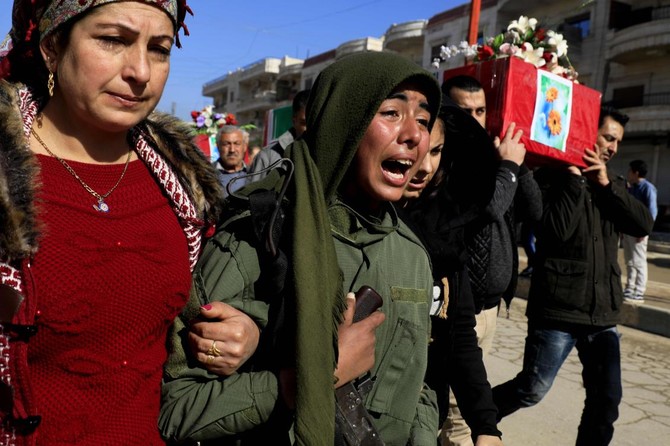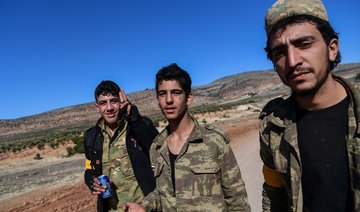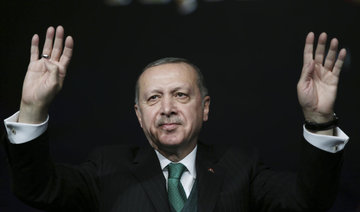AFRIN: Ammunition belts slung over their shoulders, voices cracking from the chanting, dozens of young Syrian Kurds amassed in Afrin’s town square to enlist in the “resistance” movement against a Turkish-backed assault.
They wore mismatched military gear, some in jeans and others with scarves wrapped around their faces.
A few admitted it was the first time they had ever touched a weapon, but said they felt compelled to defend their hometown.
“Afrin is where I grew up, just like my parents and my grandparents before me. This is why it’s a duty for me to fight for it,” says Asmaa, 19.
The first-year journalism student at Afrin University decided last month to leave her studies behind and respond to a call to arms by local Kurdish authorities.
Town officials called for a “mass mobilization” of civilians to fight an assault by Turkish troops and allied rebels on the Kurdish People’s Protection Units (YPG) in Afrin.
They estimate hundreds have joined so far — some deployed to the front lines while others have volunteered for hospital shifts or rescue teams that search for survivors after bombardment.
Asmaa, a black-and-white scarf wrapped around her neck, says she enlisted to take part in the fighting.
“Today, I don’t see myself as a student. I see myself as a fighter,” she says assertively.
The crowd around her splits into two lines — one for young men and one for women — and begin marching through Afrin for an impromptu military parade.
As shopkeepers look on, the youth wave YPG flags and chant, “No to occupation!” and “Long live the heroic resisters!“
“There has been an increasing number of volunteers, and each young man or woman can choose which institution they want to volunteer for depending on their experience and capacities,” says Rezan Haddu, a media adviser to YPG in Afrin.
“Some volunteered as YPG fighters, others provide logistical support like food, transportation, and clothes,” he tells AFP.
Turkey and allied Syrian rebels began their cross-border assault on the Afrin region on January 20, and most of the fighting has been concentrated along the mountainous frontier.
Ankara has blacklisted the YPG as a “terror” group for its ties to the Kurdistan Workers’ Party (PKK), which has waged a deadly and decades-long insurgency against the Turkish government.
Local authorities had to act quickly to hold off the offensive, says Jinda Tulhaldan, a leader in the Kurdish Youth Movement’s Afrin branch.
“We give them a week of military training and teach them how to use weapons,” says Tulhaldan.
“We know a week isn’t enough, but we were attacked and had to defend our city with whatever we had in front of us.”
The Afrin region juts out from Syria’s northern Aleppo province, but it is governed under a semi-autonomous system established by Kurdish factions in 2013.
Under that system, people between the ages of 18 and 32 must spend one year in military conscription, says the YPG’s spokesman in Afrin, Birusk Hasakah.
Hasakah says “hundreds” of recruits had now fully enlisted in the YPG and allied groups, including members of local government who had closed public office and taken up arms.
“Others decided to prepare tea and food to distribute to the fronts, and others are volunteering in the hospitals,” he says.
“We were trained in light weapons from the youth center in Afrin,” says Tirij Hassan, a 22-year-old attending the recruitment rally.
“It’s the first time I carry weapons, but I’m happy about it because I’ll be defending Afrin, its people, and its children.”
Turkey says it does everything it can to avoid hitting civilians.
According to the Syrian Observatory for Human Rights, 68 civilians have been killed including 21 children since Turkey launched operation “Olive Branch” last month.
At least three civilians have also been killed by rocket fire from Syria onto Turkish territory.
More than 100 YPG fighters and about the same number of pro-Turkey rebels have also died in the fight, the Britain-based monitor said.
“Turkish warplanes are bombing Afrin. They are bombing civilians and attacking us and our forces,” says Farhad Akid, a 21-year-old agricultural engineering student in the Afrin city center.
“As young men, we’ve pledged ourselves to resist, to protect Afrin and our people. We won’t allow a single Turkish occupier to enter our blessed land.”
In Syria’s Afrin, locals mobilize to defend hometown against Turkey
In Syria’s Afrin, locals mobilize to defend hometown against Turkey

Trump warns Iran of ‘very traumatic’ outcome if no nuclear deal

- Speaking a day after he hosted Netanyahu at the White House, Trump said he hoped for a result “over the next month”
WASHINGTON: US President Donald Trump threatened Iran Thursday with “very traumatic” consequences if it fails to make a nuclear deal — but Israeli Prime Minister Benjamin Netanyahu said he was skeptical about the quality of any such agreement.
Speaking a day after he hosted Netanyahu at the White House, Trump said he hoped for a result “over the next month” from Washington’s negotiations with Tehran over its nuclear program.
“We have to make a deal, otherwise it’s going to be very traumatic, very traumatic. I don’t want that to happen, but we have to make a deal,” Trump told reporters.
“This will be very traumatic for Iran if they don’t make a deal.”
Trump — who is considering sending a second aircraft carrier to the Middle East to pressure Iran — recalled the US military strikes he ordered on Tehran’s nuclear facilities during Israel’s 12-day war with Iran in July last year.
“We’ll see if we can get a deal with them, and if we can’t, we’ll have to go to phase two. Phase two will be very tough for them,” Trump said.
Netanyahu had traveled to Washington to push Trump to take a harder line in the Iran nuclear talks, particularly on including the Islamic Republic’s arsenal of ballistic missiles.
But the Israeli and US leaders apparently remained at odds, with Trump saying after their meeting at the White House on Wednesday that he had insisted the negotiations should continue.
- ‘General skepticism’ -
Netanyahu said in Washington on Thursday before departing for Israel that Trump believed he was laying the ground for a deal.
“He believes that the conditions he is creating, combined with the fact that they surely understand they made a mistake last time when they didn’t reach an agreement, may create the conditions for achieving a good deal,” Netanyahu said, according to a video statement from his office.
But the Israeli premier added: “I will not hide from you that I expressed general skepticism regarding the quality of any agreement with Iran.”
Any deal “must include the elements that are very important from our perspective,” Netanyahu continued, listing Iran’s ballistic missile program and its support for armed groups such as the Palestinian movement Hamas, Yemen’s Houthi rebels and Hezbollah in Lebanon.
“It’s not just the nuclear issue,” he said.
Despite their differences on Iran, Trump signaled his strong personal support for Netanyahu as he criticized Israeli President Isaac Herzog for rejecting his request to pardon the prime minister on corruption charges.
“You have a president that refuses to give him a pardon. I think that man should be ashamed of himself,” Trump said on Thursday.
Trump has repeatedly hinted at potential US military action against Iran following its deadly crackdown on protests last month, even as Washington and Tehran restarted talks last week with a meeting in Oman.
The last round of talks between the two foes was cut short by Israel’s war with Iran and the US strikes.
So far, Iran has rejected expanding the new talks beyond the issue of its nuclear program. Tehran denies seeking a nuclear weapon, and has said it will not give in to “excessive demands” on the subject.













